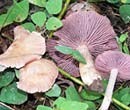
Sometimes, it's all too easy to overlook what's really important in life. Countless heroes go unsung as they carry out their important work behind the scenes. Today I would like to take a moment to acknowledge a group of unsung heroes working diligently all over the world: fungi.
Technically speaking, a "fungus" is any member of the fungus kingdom -- this includes yeasts, molds and of course, mushrooms. As a mycologist and chief scientist at Chicago Botanic Garden, I work to better understand how fungi work, why they grow where they do, what influences their populations, and how to best protect and conserve them.
Beyond being delicious on pizza, fungi are used in pharmaceuticals, help control pests that threaten our crops and play many vitally important roles in our ecosystems. For example, many mushrooms form a symbiotic -- or interdependent -- relationship with forest trees essential for both tree and fungus to survive. After wildfires like the ones we've seen in Washington and California this year, fungi move in to break down charred material and release its nutrients for the next generation of plants and animals to use as they rebuild the ecosystem. Without fungi, the world would be a very different place.
Here's a look at just a few of the amazing things that make fungi so special:
- The Original Hipsters: Fungi refuse to conform. They are so unique, they have their very own kingdom outside of the traditional plant, animal, and bacteria groupings. Fungi are also used in some denim washes to keep your skinny jeans on trend, and more than 60 different fungi species emit light from their bodies (bioluminescence) -- they shine all on their own.
Fungi are, in many ways, the backbone of our global ecosystems. This varied and fascinating Kingdom played a key supporting role in our world's history, and will continue to influence our present and future. We're only beginning to understand the depth and variety of the Fungi Kingdom, and there's a lot of important work left to be done. Mycology is also a critical component of ecology, medicine, agriculture, and many other disciplines. So next time you recover from an illness thanks to Penicillin, enjoy a wild mushroom risotto, or watch a fallen limb turn into a new habitat on the forest floor - remember to thank a fungus.
Photo Credit: © Chicago Botanic Garden
